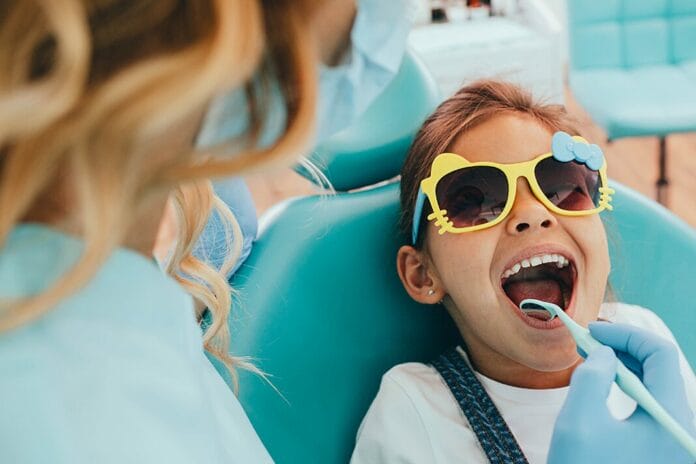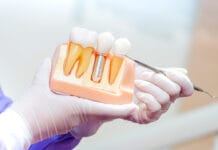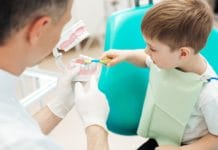The landscape of pediatric dental care is undergoing a transformation, yet innovative solutions are required to bridge gaps in comprehensive patient treatment. It has become more common to see dental hygienists employed in pediatric dental practices as the value of our skill set and credentials is becoming recognized for what we offer in practices outside of general dentistry, including pediatric dentistry. However, The absence of dental hygienists in pediatric practices is a prevalent issue and is likely affecting the quality and scope of care for young patients.
Within many pediatric dental settings, the lack of dental hygienists can lead to suboptimal therapeutic procedures. Despite the remarkable efforts of dental assistants and dentists, their tasks might not encompass comprehensive preventive care, such as subgingival biofilm and calculus removal.
The limitations in available preventive services can leave a significant gap in addressing the diverse dental needs of children. Dental hygienists are well-positioned to provide these services and various measures beyond periodontal care. These services include fluoride treatments, sealants, oral hygiene home care education, early intervention ortho and airway evaluation, habit counseling, dietary counseling, oral cancer screening for abnormal pathologies, and tailored treatments for high-risk patients.
At first glance, the value and essential role of a dental hygienist within a pediatric dental team might not be immediately evident to many. As a dental hygienist, it’s common to notice a stereotype suggesting our role isn’t immediately appreciated in pediatric dental practices. This misconception might stem from historical perceptions, where our expertise was more linked to adult or general dentistry.
Unfortunately, this history has led to a lack of understanding about our extensive training and the diverse skills we bring to pediatric settings. Some may not fully realize our ability to provide comprehensive care for children, including preventive measures and education. Changing this misconception involves educating both the public and the health care community about our vital role in pediatric dental care.
Regulations Impact Pediatric Care
Depending on state regulations and individual credentials, registered dental hygienists are licensed providers who can administer local anesthetic and nitrous oxide as adjuncts to their hygiene duties. On the other hand, state regulations further contribute to access and care disparities. Children under state insurance or Medicaid might not always receive the necessary treatments due to variations in allowable procedures, making equitable access to pediatric dental care challenging.
Clarifying the distinction between coronal polishing and complete prophylaxis becomes paramount. Many states recognize that coronal polishing is not equivalent to a complete oral prophylaxis, leading to potential billing concerns and misconceptions in treatment procedures.
So, what’s the solution? Dental hygienists emerge as a critical factor in providing specialized subgingival scaling and therapeutic treatments, especially in the context of pediatric dentistry. We play a pivotal role in closing the care gap by delivering precise and comprehensive dental services.
In addition, dental hygienists hold the potential to ensure children, regardless of their insurance status, receive the necessary treatments. Advocating for equal access to comprehensive dental care for all pediatric patients, irrespective of state insurance, is vital. Raising awareness about disparities in pediatric dental care across states becomes the first step to prompt informed action. The need for greater education and advocacy to bridge the gap between practice acts and dental procedures is essential for a more equitable pediatric dental landscape.
Adding a Hygienist to the Pediatric Team
Most of us graduated from an accredited dental hygiene program, passed the National Board Dental Hygiene Examination (NBDHE) and an approved clinical board examination, and passed the state jurisprudence exam to become registered dental hygienists. Why wouldn’t there be a need for our area of expertise in a pediatric dental office? We bring our knowledge of preventive care to patients at the start of their dental home experience.
Having the opportunity to educate both patient and guardian in the earliest years is crucial to building that lifelong trust with patients. This is the perfect opportunity to discuss nutritional/dietary counseling, evaluate growth and development, caries risk assessment, proper oral hygiene care, assess airway and oral function, eliminate any poor oral habits, placement of sealants and fluoride treatments, and so much more.
Having a registered dental hygienist in a pediatric practice allows the dentist to focus on restorative dentistry and lean on the hygienist for preventive care, just as in a general dentistry practice. This will free the dentist from scaling and can further free the dentist from administering local anesthetics for treatment procedures and delivering nitrous oxide to patients.
For example, after the dental hygienist completes hygiene treatment and administers anesthesia to a patient, the dentist can seamlessly conduct examinations and proceed immediately to necessary treatment procedures. This enhances efficiency by minimizing downtime between tasks, ensuring a smoother appointment flow for patients. Utilizing all team members to the best of their credentials allows for the highest quality of care for our patients and keeps the practice at its highest potential for production and efficiency.
In some states, dental hygienists can practice under different levels of supervision, such as general supervision, indirect supervision, or direct supervision. If the state allows general supervision, and the dentist has an emergency and is unable to see preventive care patients, the hygienist may be able to treat the patients without the doctor being present.*
*Please note that supervision levels and allowable duties vary by state. The rules regarding whether a hygienist can treat patients under general supervision and under which criteria (i.e., the frequency of patients’ last doctor exam, allowed treatment under general supervision), and what criteria a patient must meet (i.e., ASA I, age of the patient) can be found on your state’s board of dentistry/dental examiners website in the dental practice act. If the state board website and/or practice act is unclear, it is recommended to contact the board directly for clarification.
General supervision allows flexibility in not being forced to cancel the entire day of hygiene patients. It enables us to continue providing preventive care to children, even if unforeseen situations arise where the dentist cannot be present. This helps ensure that scheduled appointments for children’s hygiene treatment can proceed without interruptions, prioritizing their ongoing dental care and well-being.
Further, adding another licensed provider in the practice allows the dentist to lean on them for leadership and guidance for team members. We work in partnership with the doctor to lead our team and provide the best care to our patients. The dental hygienist can work as the intermediary between the doctor, their patients, and their team.
Our goal is to create a positive dental experience for children and support parents in nurturing their children’s oral health from an early age. This helps uphold the practice’s mission and vision statements and helps the practice grow to its best potential. It also helps support the doctor in keeping their focus on the fundamentals of restorative dentistry at hand.
As dental hygienists, we are health care providers who can bring structure and support to a pediatric office with our skill set and knowledge. Displaying our value and worth as providers will help establish ourselves in other settings.
Practicing Dental Hygiene In a Pediatric Office
Of course, having the right attitude and energy to practice in a pediatric dental office is crucial. In the pediatric setting, the attitude and energy require an extra dose of warmth, patience, and creativity. It’s about being playful, cheerful, and able to connect with children on their level. This means approaching dental care with a positive and friendly demeanor and using language and gestures that make children feel comfortable, ensuring a more enjoyable and stress-free experience.
Continuing education courses are available to help hygienists prepare for roles in pediatrics and special needs dentistry. Similar to any specialized field, it may not be a perfect fit for everyone, but the rewards are incredibly fulfilling for those passionate about it.
In Closing
The transformative potential lies in empowering dental hygienists to provide specialized care and ensuring that all pediatric patients receive comprehensive, equitable dental treatments. This advocacy creates a call to action, promoting awareness and proactive measures toward resolving disparities in pediatric dental care.
Before you leave, check out the Today’s RDH self-study CE courses. All courses are peer-reviewed and non-sponsored to focus solely on high-quality education. Click here now.











